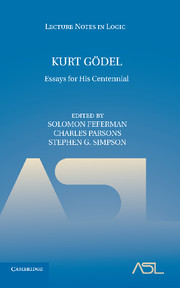Book contents
- Frontmatter
- Contents
- Introduction
- GENERAL
- PROOF THEORY
- Gödel and the metamathematical tradition
- Only two letters: The correspondence between Herbrand and Gödel
- Gödel's reformulation of Gentzen's first consistency proof for arithmetic: The no-counterexample interpretation
- Gödel on intuition and on Hilbert's finitism
- The Gödel hierarchy and reverse mathematics
- On the outside looking in: A caution about conservativeness
- SET THEORY
- PHILOSOPHY OF MATHEMATICS
On the outside looking in: A caution about conservativeness
Published online by Cambridge University Press: 04 August 2010
- Frontmatter
- Contents
- Introduction
- GENERAL
- PROOF THEORY
- Gödel and the metamathematical tradition
- Only two letters: The correspondence between Herbrand and Gödel
- Gödel's reformulation of Gentzen's first consistency proof for arithmetic: The no-counterexample interpretation
- Gödel on intuition and on Hilbert's finitism
- The Gödel hierarchy and reverse mathematics
- On the outside looking in: A caution about conservativeness
- SET THEORY
- PHILOSOPHY OF MATHEMATICS
Summary
§1. I propose to address not so much Gödel's own philosophy of mathematics as the philosophical implications of his work, and especially of his incompleteness theorems. Now the phrase “philosophical implications of Gödel's theorem” suggests different things to different people. To professional logicians it may summon up thoughts of the impact of the incompleteness results on Hilbert's program. To the general public, if it calls up any thoughts at all, these are likely to be of the attempt by Lucas [1961] and Penrose [1989] to prove, if not the immortality of the soul, then at least the non-mechanical nature of mind. One goal of my present remarks will be simply to point out a significant connection between these two topics.
But let me consider each separately a bit first, starting with Hilbert. As is well known, though Brouwer's intuitionism was what provoked Hilbert's program, the real target of Hilbert's program was Kronecker's finitism, which had inspired objections to the Hilbert basis theorem early in Hilbert's career. (See the account in Reid [1970].) But indeed Hilbert himself and his followers (and perhaps his opponents as well) did not initially perceive very clearly just how far Brouwer was willing go beyond anything that Kronecker would have accepted. Finitism being his target, Hilbert made it his aim to convince the finitist, for whom no mathematical statements more complex than universal generalizations whose every instance can be verified by computation are really meaningful, of the value of “meaningless” classical mathematics as an instrument for establishing such statements.
- Type
- Chapter
- Information
- Kurt GödelEssays for his Centennial, pp. 128 - 142Publisher: Cambridge University PressPrint publication year: 2010
- 4
- Cited by



